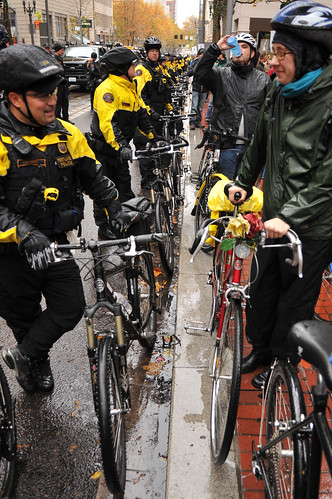The desire to equip and train first responders, which serves both a legitimate purpose and meets the agendas of industry and politicians, has introduced military technology into civilian/domestic police forces to an unprecedented degree. For the Homeland Security-Congressional-Military-Industrial-Complex, it's a market opportunity wrapped in the flag.
 When a G-20 type event comes to a city, or when law-abiding citizens exercise their constitutional rights of protest and assembly (which, BTW, was kind of what the Revolutionary war was about) it is handled as a military event. The photo shows military officers on the streets of my city during a G-20, when tear gas, stun grenades, and the LRAD sound cannon were used on peaceful citizens.
When a G-20 type event comes to a city, or when law-abiding citizens exercise their constitutional rights of protest and assembly (which, BTW, was kind of what the Revolutionary war was about) it is handled as a military event. The photo shows military officers on the streets of my city during a G-20, when tear gas, stun grenades, and the LRAD sound cannon were used on peaceful citizens.Edit 11/18: The LRAD made it's debut in New York City Nov. 17th. "The peculiar weapon system symbolizes the creeping Israelification of America's local police forces and the Palestinianization of all who challenge the predations of a zero tolerant 1 percent master class. h/t:spork
The seminal difference is, as Arthur Rizer & Joseph Hartman pointed out in The Atlantic this week, that the role of police is to "protect and serve". Who do they protect and serve? Citizens. The role of soldiers is to seek and destroy. Who do they destroy? The enemy, and an external enemy at that.
When military tools, and military training, and military techniques are extended into domestic operations, the nature of civilian policing changes. Most alarmingly, the description of the population changes; what were once "civilian protesters" too easily become "the enemy".
We have a distinctly different set of laws/rules/norms addressing domestic behavior and foreign warfare. Is waterboarding permissible for busting drug smuggling? Can we use drones to monitor political protests? (See, Texas city deploys drones.)
But wait there's more - if we conducted a one-year war after 9/11, perhaps the opportunity for military contamination of domestic police forces would have been limited. We're a decade into these wars. There are a decade's worth of veterans coming out of the service, and God bless them for it, and they're looking for work.
Who's employing those vets? Police departments, State police, and the FBI. It's not just that we're giving military tools to civilian Barney Fife's, who understand that Thelma and Aunt Bee are citizens; we're taking these people out of Iraq and Afghanistan and Somalia etc and putting them in uniform in Podunk and giving them the same tools they've used before - does anybody expect that to not have an adverse impact on civil liberties?
Perhaps the two ends of the spectrum of militarized police forces are New York City and Portland, Oregon.
In New York City, home to Ground Zero and the NYPD, a police department with the capability of taking down planes without federal guidance when it sees fit, police are perhaps more militarized then anywhere else in the country (excluding DC).
NYPD is responding to the Occupy protestors as the enemy. They're encouraging the city's vagrants to “take it to Zuccotti”. They used a night-time "shock and awe" display to force the demonstrators out of the park.
It leaves me wondering: who/what are they serving and protecting?
 In Portland, Oregon, the police have taken another approach. Here's the Portland headline: Police on bikes meet protestors on bikes: Smiles, dialogue ensue.
In Portland, Oregon, the police have taken another approach. Here's the Portland headline: Police on bikes meet protestors on bikes: Smiles, dialogue ensue. Portland police have taken the initiative of providing security for the Occupy citizens. "If we weren't providing a large police presence this wouldn't be safe," Police Chief Mike Reese said, as he did a walk through the camp today. "The dynamic of the camp is changing. We're finding more homeless, and road-warrior type street youth here."
Mayor Sam Adams is tracking overtime expenses. "In seeing what we are facing here in terms of overtime costs versus what some other cities have faced in terms of overtime costs related to less than peaceful interactions, I'm pleased that our costs will be lower because we have dealt with this in a more peaceful manner than other places," Adams said.
Is it protect-and-serve or seek-and-destroy?
Are the Occupy protesters Citizens or Enemy?
If we zapped a 1770 American colonist protesting the King into today's Manhattan, would we tolerate his protest or lock him up?
 |  |  |
| A Countdown of Sorts: Eight Days and A WakeUp | ||
 |  |  |



0 comments:
Post a Comment
Comments and Feedback? Love that stuff. Please leave your thoughts in the box below--